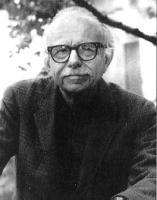美国
(
1914年~
1997年)
 大卫·伊格内托
大卫·伊格内托
二十世纪美国著名诗人,生于纽约市,1964年以来先后在肯塔基大学、堪萨斯大学、瓦萨尔学院、纽约市立大学、纽约大学和哥伦比亚大学教授文学创作,1936-1976年间主编过一些诗刊,其中包括著名的《美国诗歌评论》。他从1948年以来出版了十多卷诗集:《诗》(1948)、《温和的举重者》(1955)、《再说一次》(1962)、《人类的形象》(1964)、《大地坚硬:诗选》(1968)、《营救死者》(1968)、《诗集:1934-1969》(1970)、《面对树木》(1975)、《诗选》(1975)、《踏上黑暗》(1978)、《对地低语》(1981)、《让门敞开》(1984)、《新诗集》(1986)、《给地面投影》(1991)等多卷,另外还著有散文三卷。他曾经多次获得过一些中药的诗歌奖,其中包括古根海姆、波林根、佛洛斯特、雪莱纪念奖、美国文艺学院诗歌奖,同时,他还被推选为美国诗歌协会的终身主席。
伊格内托被公认为当代美国寓言式诗歌大师。他的诗短小、直接、避免使用修饰词和富于“诗意”的词语,具有十分鲜明的“反诗歌”特征。他的诗歌还兼具现代寓言性质,且倾向于情节性,把日常生活上升到哲学境界,以超现实主义手法揭示出现代人的生存环境及其压力。
David Ignatow was born in Brooklyn on February 7, 1914, and spent most of his life in the New York City area. He was the author of numerous books of poetry, including Living Is What I Wanted: Last Poems (BOA Editions, 1999), At My Ease: Uncollected Poems of the Fifties and Sixties (1998), I Have a Name (1996), Against the Evidence: _Select_ed Poems, 1934-1994 (1994), Despite the Plainness of the Day: Love Poems (1991), Shadowing the Ground (1991), New and Collected Poems, 1970-1985 (1986), Leaving the Door Open (1984), Whisper the Earth (1981), Conversations (1980), Sunlight (1979), Tread the Dark (1978), _Select_ed Poems (1975), Facing the Tree (1975), Poems: 1934-1969 (1970), Rescue the Dead (1968), Earth Hard: _Select_ed Poems (1968), Figures of the Human (1964), Say Pardon (1962), The Gentle Weightlifter (1955), and Poems (1948).
During his literary career, Mr. Ignatow worked as an editor of American Poetry Review, Analytic, Beloit Poetry Journal, and Chelsea Magazine, and as poetry editor of The Nation. He taught at the New School for Social Research, the University of Kentucky, the University of Kansas, Vassar College, York College of the City University of New York, New York University, and Columbia University. He was president of the Poetry Society of America from 1980 to 1984 and poet-in-residence at the Walt Whitman Birthplace Association in 1987.
Mr. Ignatow's many honors include a Bollingen Prize, two Guggenheim fellowships, the John Steinbeck Award, and a National Institute of Arts and Letters award "for a lifetime of creative effort." He received the Shelley Memorial Award (1966), the Frost Medal (1992), and the William Carlos Williams Award (1997) of the Poetry Society of America. He died on November 17, 1997, at his home in East Hampton, New York.

